Chris Froome: I can win five more Tour de France titles - Q&A
- Published
Chris Froome on Tour de France, fan abuse, anti-doping and the Vuelta
Britain's double Tour de France champion Chris Froome believes he can win the race five more times.
Froome won for a second time in Paris in July but faced accusations of doping and abuse from the crowd and said "no sportsman should have to go through what we went through".
When asked in an exclusive interview with the BBC's sports editor Dan Roan whether he could win five more Tours, Froome said: "Why not? I'm 30, other riders have won Tours into their late 30s, potentially I've got another eight or nine years left in me."
In the wide-ranging interview, Froome also discusses the forthcoming Vuelta, winning over the doubters and impending fatherhood.
Dan Roan: There has been talk of knighthoods and Sports Personality of the Year back home, and it seems to me that the British public has really grasped what you achieved at the Tour this year: how does that level of recognition feel?
Chris Froome: It's amazing but it still feels a little bit surreal, it's not like I've changed as a person. I understand that (winning the Tour twice) is a massive accomplishment but I still wake up every morning and have to get out and go training. Not much has changed, so it's still taking a bit of getting used to.
DR: How many Tour de France titles do you think you can win?
CF: It's tough to say but I'd love to keep racing until my late 30s, for as long as my body will allow me to. I'd like to think I could go back again for the foreseeable future, four or five years at least…
DR: You think you can win five more Tours?
CF: Why not? I'm 30, other riders have won Tours into their late 30s, potentially I've got another eight or nine years left in me.
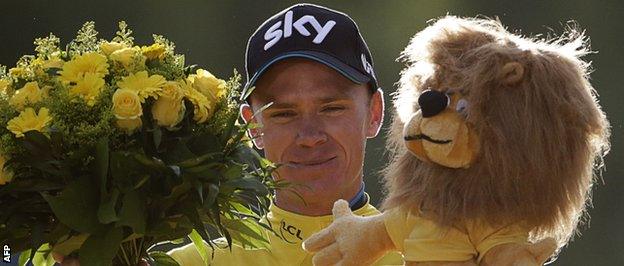
Froome is the first Briton to win the Tour de France twice
DR: You looked pretty tired after the Tour. Why have you decided to go for the Vuelta just four weeks later?
CF: It's been on the back of mind from the start of the season but I wanted to see how I felt after the Tour and check that the motivation is still there. Once I was able to get out for a few rides I could see I didn't feel too bad and could give it a go. And it's just that: I'm not going to make any big promises or set the bar too high. I can go in there and give it my best shot. If it works out, fantastic; if not, I'm sure I can do a job for somebody else in the team.
DR: To win both, in that order, would be unprecedented (Jacques Anquetil and Bernard Hinault have won Tour/Vuelta doubles when the Spanish race was run in the spring). How big an achievement would it be?
CF: With the way the schedule is these days, it is very difficult to back up Grand Tours like that. We've seen Alberto Contador not quite at his best at the Tour having done the Giro earlier, and I also did the Vuelta in 2012 after I came second in the Tour and I really felt it was hard. When it came to that last week I was on my hands and knees. So I'm hoping I don't end up in the same boat but I'm realistic and I know it could be the case.
DR: You won the King of the Mountains jersey at the Tour, too, and I wonder if you think your feats this year have led to a breakthrough with the British public?
CF: I really appreciate that people have recognised the accomplishment and how much hard work and dedication that takes, that is a great feeling. But at the end of the day I'm not racing for recognition, I'm not racing for popularity, that's not who I am. I'm focused on the result and trying to get the best out of myself from a sporting capacity. That's what really motivates me.
DR: You could have spent the last few weeks giving interview after interview - as many sports people would have if they had achieved what you had - but you didn't. Why?
CF: I think it goes back to what I'm trying to get from the sport: what my goals are. I'm not in it for popularity or commercial reasons. As an athlete I'm very focused on goals and 10 days after the Tour I was already thinking: 'OK, we're on to the next thing now and we're looking after my conditioning for the Vuelta.'
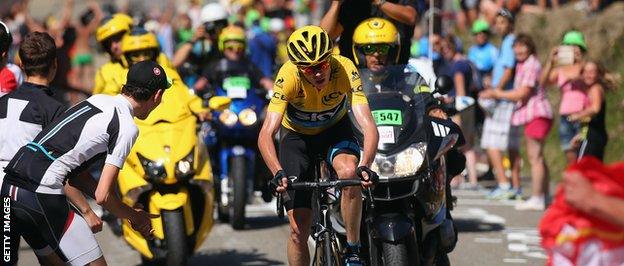
Froome was subjected to abuse from spectators at this year's Tour
DR: You got some pretty raw treatment at the Tour. Are you philosophical about that now or still angry?
CF: I don't think any sportsman should have to go through what we went through. I mean urine thrown at you, Richie Porte was punched, I was spat on by spectators. I don't believe that should happen.
DR: Did it spur you on as a team?
CF: I think that's what was great about this year's team: it made us really dig in and say we've got to stick together and come out on top.
DR: But when somebody spat at you were you ever tempted to get off and hit them?
CF: I'd love to have a conversation with these people and say to them: 'What's the issue here? Because I know there is nothing untoward about what I've done to get here.'
But if people are being told otherwise that's what they're going to believe, especially if it is by supposed cycling experts. It's pretty damaging but it's important to say that it wasn't the whole of France doing this, it was scattered individuals. If you think of the 12 million who came out to support the Tour, it was probably less than 1% who were negative and anti-Sky - although you hear that 1%, they're louder than the majority.
DR: Did it toughen you up?
CF: I feel as if I'm now used to what it means to be a leader of the Tour de France. I've done it a few times and nothing shocks me. Even this year, when a few things happened, I knew we had a job to do and that we were living the dream as leaders of the Tour de France.
DR: There was the incident with Vincenzo Nibali on the team bus and I have heard team-mates talk about you as a 'pit bull' and yet you come across as very polite and softly-spoken. Did you make a conscious decision to change?
CF: No, but after the season I had last year - crashing out, breaking my hand and wrist - I came into the Tour ready to race, so of course I was ready to stand up for myself. I was not going to let anything get in the way. I thought I'm not going to stand for this: I'm going to sort it out.
DR: You live in France: do you ever get any stick here?
CF: No, it's absolutely the opposite. And I did some criteriums (town-centre exhibition races) in France after the Tour and the reception was incredible. All the kids and parents came out and they were loving getting a photo with me. There was no negativity whatsoever. I really think that is going to continue next year. The negativity was all about certain French commentators doing their job in a way that was very irresponsible.
DR: It looked pretty hairy for a moment on that penultimate stage. How close were you to losing the race?
CF: I knew I had a good lead and my team was fantastic in getting to the bottom of Alpe d'Huez but Nairo Quintana was off up the road and taking a lot of time back, so there were moments when I'm sure my team-mates also felt a little bit nervous.
DR: Has the criticism you receive, the doubts you hear about your performances, ever made you think about quitting the sport?
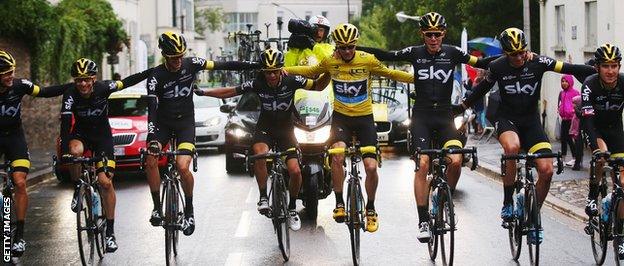
The win for Froome means a Briton, and Team Sky, have now won three of the last four of cycling's showpiece races.
CF: No, I love this sport. I am going to keep racing as hard as I can until this body doesn't allow me to any more. All of that is just a sideshow. It's not going to stop my goals or ambitions.
DR: Do you think you can win the doubters over in time?
CF: That's not my goal as such, but I do want to be a spokesman for clean cycling - I believe somebody has to stand up for the current generation. I'm happy to do that. I'm happy to release more information when I can and to show people that they can trust these performances. Because from my point of view, if I can win the Tour de France clean, then you can win any bike race clean.
DR: You're going to be a dad soon, what a year for you. Are you ready for that?
CF: Yeah, I've got a little boy coming and I can't wait. It's going to be the biggest thing that has happened to me in my life so far. Bigger than any Tour de France win.
DR: One thing that strikes me is that British cycling fans would love to see more of you: would you consider competing in Britain more often?
CF: I'd love to do more racing in Britain. I'd love to do the Tour of Britain but it's always such a hard choice for me to do that or the Vuelta, which is a Grand Tour. I'd really like to do both but they clash. But who knows, maybe next year I could come over to the Tour de Yorkshire. I'd certainly like to do more racing in the UK.
DR: Watching those mountain stages on TV, I am always amazed at how close the fans get to the riders. What is it like riding through those corridors of people?
CF: It's pretty grippy at times, especially when you know a lot of the spectators have been drinking all day - you can smell it on their breath! You do wonder if they're going to get out of the way and you just try to pick a line through them. But that's one of the great things about the Tour de France, that the fans can get that close. I don't think there's any other sport like that.
- Published13 August 2015
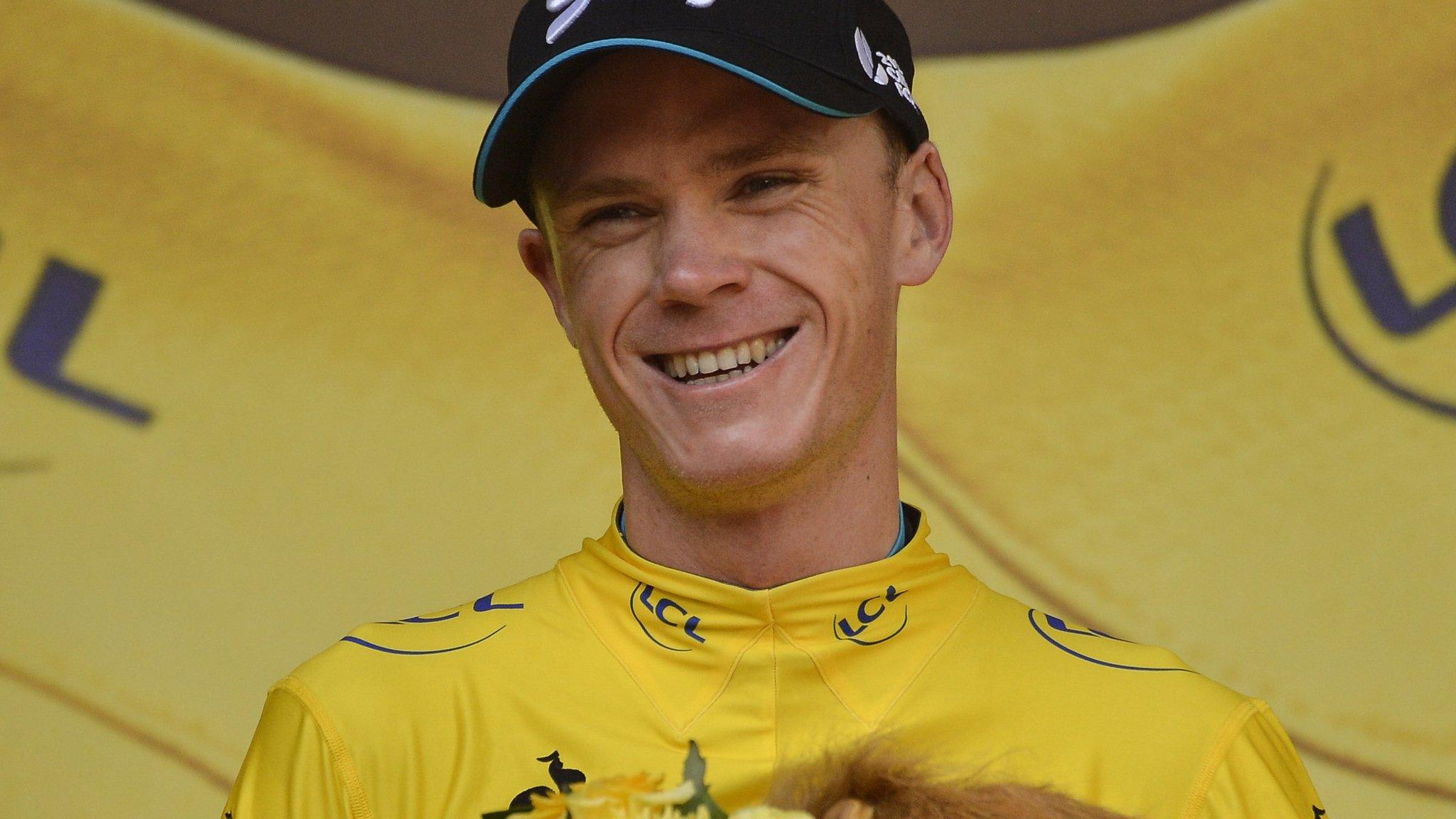
- Published12 August 2015
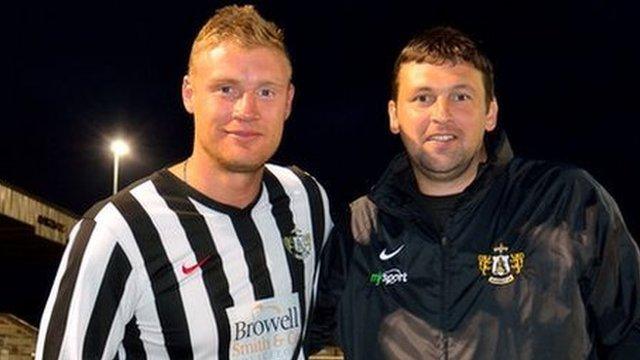
- Published26 July 2015
- Published4 September 2014
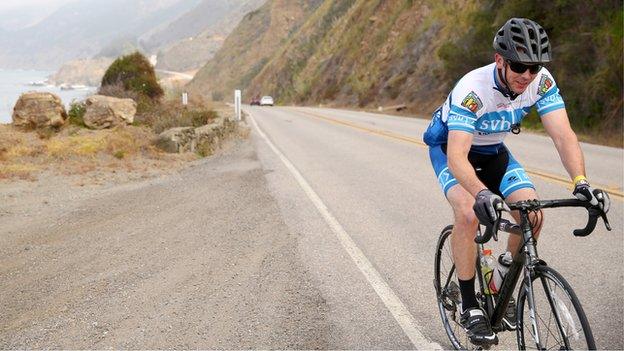
- Published19 July 2016
